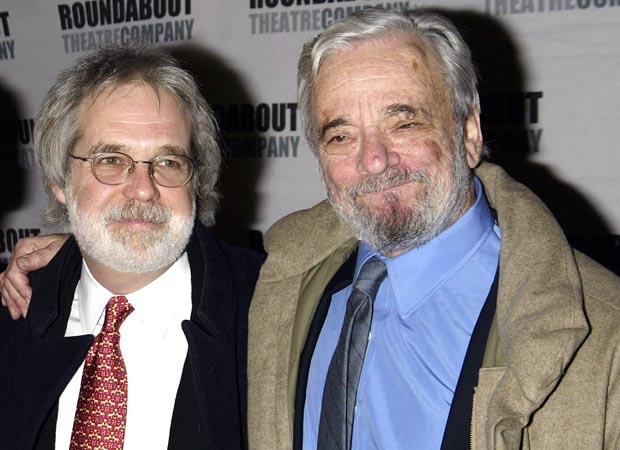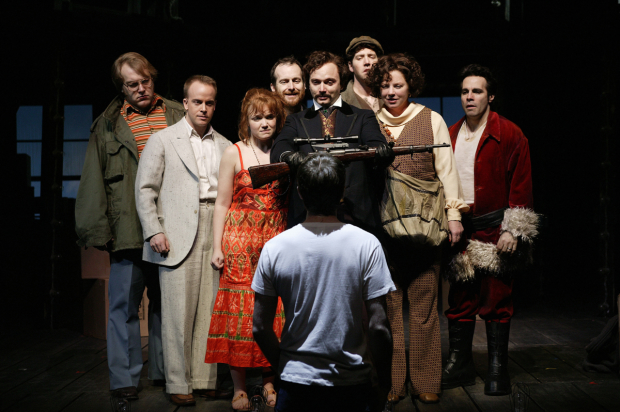John Weidman Looks Back on Creating Assassins With Stephen Sondheim
"I'm always curious to see what people and critics make of Assassins, and how the general attitude towards the show has evolved and changed," book writer John Weidman says. This musical, with a Stephen Sondheim score, was a divisive one upon its premiere at Playwrights Horizons in 1990. Exploring the lives and motives of the men and women who attempted (and/or succeeded) in murdering various presidents of the United States, Assassins was dark even by Sondheim's standards, and his canon involves cannibalistic pie makers, murderous barbers, and tyrannical stage moms.
Reviews were not great, Weidman remembers, but Assassins became a cult classic, with most of its future production, he later learned, taking place on college campuses. A Broadway premiere in 2004, which starred Neil Patrick Harris and Michael Cerveris, resuscitated the piece in the professional setting, earning that year's Tony for Best Revival of a Musical.
Now, during a very turbulent time in American political history, Weidman is getting ready to see the piece back onstage in an Encores! Off-Center production at New York City Center July 12-15. Directed by Anne Kauffman, the cast features a rogue's gallery of New York stage favorites, including Steven Pasquale, Alex Brightman, Steven Boyer, and Victoria Clark.
As rehearsals began, Weidman looked back on the creation of this unique musical, one that was, in his words, "the most satisfying writing experience, from a process point of view, that I've ever been engaged in."

(© Joseph Marzullo)
Tell me about the evolution of Assassins.
I had gone to Steve with an idea for an entirely different show. He and I talked about it and he said, "It doesn’t really feel like a musical. What do you think about this? Assassins." And I said, "OK, say some more."
He had been one of the judges of a musical theater competition and one of the submissions was a musical by Charlie Gilbert, which was about a Vietnam vet who gets involved with a shadowy conspiracy to attack the president. What Steve mostly liked was that Charlie's piece was decorated with occasional appearances by assassins from American history: John Wilkes Booth, Charles Guiteau. He had found those characters fascinating. As Steve would say, they led inherently dramatic lives simply based on the way those lives ended.
We started to talk about them without any preconceived notion and I realized not long into this series of conversations that where we seemed to be heading had a very personal meaning for me.
How so?
I was in high school when Kennedy was assassinated, and it was my first real experience of loss. The whole Camelot thing is hard to evoke for somebody who didn’t actually live through it, but the connection between people my age and the future that Kennedy seemed to represent was electric and very emotional. I was devastated by his assassination. A couple of friends and I took the train down to Washington, D.C., and stood on the sidewalk and watched the funeral cortege go by.
I think I was always confused and bewildered by what had happened, how it happened, and what it meant. The notion that that kind of grief, not just national but international, could be caused by one angry man in a T-shirt with a rifle seemed inexplicable to me. When Steve and I started talking about these characters, I thought "They all had wildly different motives, but if we gather them together and let them talk to each other, is it conceivable that some common thread would begin to emerge that would help explain where these kinds of violent acts, which have taken place in this country in a way they don’t take place in other countries, came from?" That exploration drove the writing of the show from that point on.

(© Joan Marcus)
What kind of research did you do?
It was surprising to discover how limited the available research was on most of these individuals. You could read forever about John Wilkes Booth and Lee Harvey Oswald, but Czolgosz, Charles Guiteau, not so much. There was one book by James Clark that did pull them all together, and it included a short biography of each of them. You have to go into the archives of the New York Times, really, to find out much about Sam Byck, the guy who tried to hijack a plane and crash it into the White House. When I felt like I had absorbed enough, I put the research aside and the writing started. It is the most satisfying writing experience from a process point of view that I've ever been engaged in. I'd like to think that's reflected in the finished product.
Are you apprehensive about the way the show will be received in the current political climate?
Apprehensive? No. The show has been performed continuously, one place or another, for 25 years, first when we had a conservative Republican in the White House, then when we had a centrist Democrat, then when we had a conservative Republican, and then a centrist Democrat who was black. Now we have a different kind of president. Clearly, the political environment is a more turbulent one than has necessarily been the case during that 25-year period. But we'll see. The show is the same, the text is the same, and I think people will come into the theater and bring in whatever they bring in.
What are you most looking forward to about the Encores! Off-Center production?
I'm looking forward to seeing what people make of it. It's the kind of show where you want people to be talking as they leave the theater and head home afterwards. I'd love to be able to eavesdrop on these conversations.












